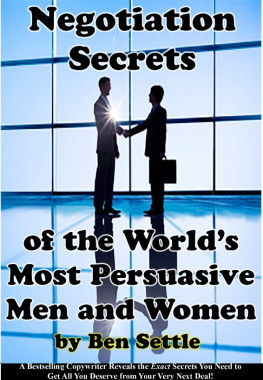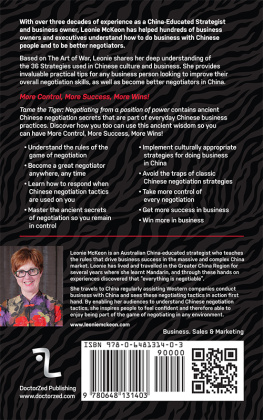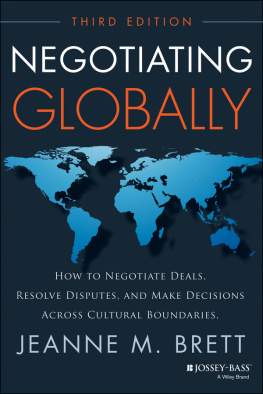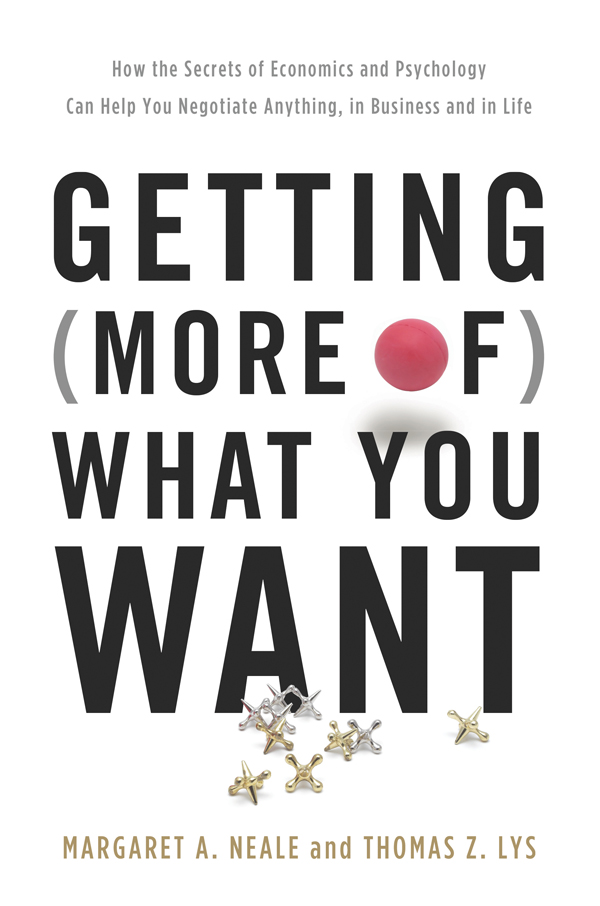GETTING (MORE OF) WHAT YOU WANT
GETTING (MORE OF)
WHAT YOU
WANT
How the Secrets of Economics and Psychology Can Help You Negotiate Anything, in Business and in Life
MARGARET A. NEALE AND THOMAS Z. LYS
BASIC BOOKS
A Member of the Perseus Books Group
New York
Copyright 2015 by Margaret A. Neale and Thomas Z. Lys
Published by Basic Books,
A Member of the Perseus Books Group
All rights reserved. Printed in the United States of America. No part of this book may be reproduced in any manner whatsoever without written permission except in the case of brief quotations embodied in critical articles and reviews. For information, address Basic Books, 250 West 57th Street, New York, NY 10107.
Books published by Basic Books are available at special discounts for bulk purchases in the United States by corporations, institutions, and other organizations. For more information, please contact the Special Markets Department at the Perseus Books Group, 2300 Chestnut Street, Suite 200, Philadelphia, PA 19103, or call (800) 810-4145, ext. 5000, or e-mail special.markets@perseusbooks.com.
Designed by Milenda Lee
A CIP catalog record for this book is available from the Library of Congress.
ISBN: 978-0-465-05072-7 (hardcover)
ISBN: 978-0-465-04063-6 (e-book)
10 9 8 7 6 5 4 3 2 1
To Franziska and Al, our parentsboth passed and presentand the four-legged family members, all of whom have made our lives so much more than we could have ever imagined.
CONTENTS
PREFACE
In early 1996, when we were both teaching at the Kellogg Graduate School of Management at Northwestern University, one of our students approached Thomas for help in responding to a business opportunity. A physician had offered the student, a product manager for a large pharmaceutical company, the opportunity to purchase a patent the company had been using for the last ten years in the production of one of its most profitable medical test kits. In the past, the physician had received annual royalties based on successfully produced kits. And each royalty cycle, the physician and the company disagreed over the exact number of successful kits that had been produced. Ostensibly tired of these annual disputes, the physician was offering to sell the patent to the corporation for the remainder of its seven-year life. His asking price was $3,500,000.
Before responding to the physicians offer, our student wanted Thomas to check his analysis of the most his corporation should be willing to pay based on their estimate of the expected value of the royalty payments for the next seven years. The analysis was quite involved, and revealed that the maximum amount the corporation could pay for the patent was $4,100,000. At that price, there was no difference to the company between owning the patent and continuing to lease it from the doctor.
Margaret walked in as the student was summarizing his analysis: he could accept the physicians offer and realize an immediate profit of $600,000 ($4,100,000 $3,500,000). Or, if he were to negotiate, he could likely secure an even better deal by not accepting the doctors first offer: If I could get him to agree to $3,000,000 or so, I would realize a $1,000,000 benefit for my company, said the product manager. This will make me look so goodmy next promotion is virtually assured.
Just a second, said Margaret, who had been reviewing the details of the offer. Youre not ready to negotiate. The student was surprisedand was even more so when Thomas commented: Shes right.
Our student was way ahead of himself. In his mind, he was already enjoying the $1,000,000 benefit of this prospective deal. Because he was so taken with the potential benefit and what that could mean for his future with the company, he had come up with a number and then leaped to an obvious, but woefully incomplete, answer.
In the students analysis, the deal looked like a sure win of at least $600,000 for the companybut from the doctors perspective, the offer made no sense. Given the facts, he simply was asking for too little. A deal should make sense to both sidesand this one doesnt, said Margaret, continuing, and why, after ten years of leasing the patent to you, has he now decided he should sell? Maybe, we suggested, the numbers alone didnt tell the full story.
Thomas stepped up to the white board where he and the student had done their calculations. Except this time, they looked at the deal from the doctors perspective. That analysis showed that the expected present value of the payments to the physician for the next seven years under the current arrangement was approximately $5,000,000. Why is he willing to make an opening bid of $3,500,000, when the status quo is worth approximately $5,000,000 to him? asked Margaret. Seeing where we were going, our student made a last-ditch effort to save his promotion: Maybe the doctor cant do present values, or
Or maybe he knows something you dont know, said Margaret.
Our student had fallen into a classic negotiation trap. He had focused on the analysis from his own perspective, ignoring the doctors side. Caught up in the prospect of closing the deal, he became convinced by his initial, favorable computations and failed to do any due diligence.
Three psychological factors contributed to his behavior: the power of a familiar story, the confusion of accuracy and precision, and the inherent attraction of reaching an agreement. First, the company and the physician had a decade-long relationship, and our student was only too familiar with the patent and the difficulties that had arisen from the contract. It was easy for him to believe that the doctor had decided to sell the patent simply as a matter of convenience.
Second, our student had computed a value for the patent (to several decimal points) that made sense to him and promised a quick deal and a great return. Although his numbers were precise, he had done precious little to test their accuracy.
Finally, once people are negotiatingas they had already begun to do since the doctor had made the first offergetting to yes often feels like success, even if accepting the deal were not in all parties best interest. For example, negotiators are more likely to choose an outcome that is worse for them if that outcome is labeled agreement than if it is labeled option A. All of those factors made it easy for our student to take the next obvious step: Get the deal done and move on!
Driven by these psychological factors, the student might have rushed to close a deal with the physicianbut after considering our advice, he decided to conduct some further analysis. After consulting with us, the company decided not to pursue the doctors offer. In less than a year, the company was using a new patent (not developed by the doctor) that was superior to the original one. The original patent had become essentially worthless. Systematically integrating psychological principles into economic calculations led to a superior outcome for both our student and his organization: He avoided wasting $3,500,000 and likely losing out on acquiring the new patent to boot. With our help, he took a more disciplined approach to calculating the economic value of the deal for both parties, while also acknowledging the psychological pressure to reach a dealall of which ultimately led him to temper his initially bullish analysis. By integrating economic and psychological perspectives in this way, both our student and his company were able to get more of what they wanted: not only did they avoid losing $3,500,000 on a soon to be obsolete patent but it also allowed them to secure the rights to the new technology.
* * *











